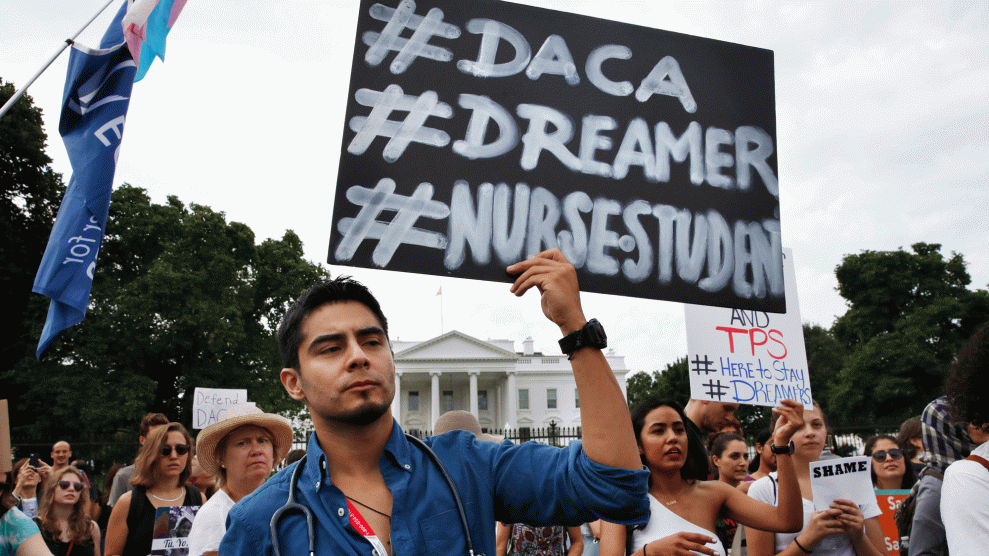
Protesters rally in support of DACA outside of the White House on Tuesday, September 5. Jacquelyn Martin/AP
It only took a few hours for the first lawsuit to be filed against the Trump Administration for its decision on Tuesday morning to end the Deferred Action for Childhood Arrivals program, known as DACA. The Obama-era policy protected nearly 800,000 undocumented immigrants who came to the United States as children. It allowed them to receive work visas, driver’s licenses, and spared them from imminent arrest and deportation. At a press conference in Washington D.C., Attorney General Jeff Sessions called Obama’s implementation of the policy in 2012 “an unconstitutional exercise of authority,” and rescinded it in order to retain what he calls the country’s “unsurpassed legal heritage.” “We simply can’t admit everyone who comes here,” he said. Sessions referred to DACA beneficiaries—commonly called Dreamers—as a “group of illegal aliens” who contribute to the country’s “lawlessness” and steal jobs from American citizens.
Not a single one of the current DACA recipients has a criminal record, which is a condition of the policy, and research has consistently shown that DACA recipients have been a boon to the American economy. (Last month, the Center for American Progress published the largest study to date on DACA recipients, finding that 97 percent of the respondents were either currently working or enrolled in school.)
But opponents have long challenged the legality of the policy, and earlier this summer, a group of of Republican officials from ten states, led by Texas Attorney General Ken Paxtion, threatened to sue President Trump if he did not end the program by September 5. In response, 100 law professors signed a letter arguing that there is “no question” of DACA’s legality, urging President Trump to continue the program despite the legal threat. One of those professors was Stephen Yale-Loehr, an immigration law attorney and law professor at Cornell University who co-authored Immigration Law and Procedure, a 21-volume treatise on U.S. immigration law. He spoke with Mother Jones to help make sense of the Trump Administration’s decision on Tuesday.
Mother Jones: In his announcement today, Sessions said the DACA policy was implemented “unilaterally to great controversy and legal concern.” What are those legal concerns?
Stephen Yale-Loehr: Some felt that President Obama overreached and took action that really was intended for Congress to take instead. Although prior presidents had issued prosecutorial discretion in the past as to deciding who can stay in the United States, they had never done it on such a large scale, particularly combined with issuing them[immigrants] work permits and the ability to get social security cards. Some felt he was basically usurping Congress’s legislative function to decide who can stay in the United States.
MJ: Do you agree with that?
SYL: I disagree with that. I and 100 other law professors signed a letter in mid-August saying that what President Obama did was lawful and that it was the proper exercise of prosecutorial discretion. Nobody has the money or number of officers to be able to round up and deport 11 million unauthorized immigrants in the United States, so every president has to prioritize which ones they want to target. President Obama used that same prosecutorial discretion that other presidents had used before him to decide that the people we call Dreamers, as long as they have not committed any crimes, were really low-priority for deportation, and therefore he decided to defer their deportation for two years and along with that give them the opportunity to get work permits. It was on a larger scale numerically than prior presidents had exercised, but it was similar.
MJ: Both President Trump and AG Jeff Sessions in their statements claimed that the DACA program contributed to the child migrant crisis, which hit a peak in 2014. Are these two events related?
SYL: I don’t know the basis for that statement. I listened to that too and sort of scratched my head. There was no legal change between 2012 and now. I’d guess you’d have to ask migrants themselves who crossed if they’d heard of DACA or not; I suspect not.
MJ: Dreamers would have to have been here by 2007 or beforehand, and anyone who arrived afterwards would not be eligible for DACA protections, correct?
SYL: That is correct.
MJ: Sessions equated DACA to an “open border policy.” Is that fair?
SYL: No, I think the Obama Administration simply prioritized that Dreamers are relatively low risk for deportation. I don’t think it’s “open borders” to say that certain people can remain here. We’ve always had prosecutorial discretion to decide that certain people, for humanitarian reasons, should be allowed to remain here even if they are otherwise eligible for deportation.
MJ: Sessions referred to “imminent litigation” as among the reasons for reviewing DACA. What was that about?
SYL: The attorneys general of ten states threatened to file suit today, claiming that the DACA program was illegal. That was the deadline by which the Trump Administration had to make a decision on the program. Attorney General Sessions said that he felt that if such litigation were to start, it probably would succeed, and therefore it would be better to terminate the program.
MJ: Do you agree that it probably would have succeeded?
SYL: I think there was a good chance it would have succeeded because the plaintiffs would have filed their complaint in the same court that held that the prior DAPA program [an expansion of DACA that would have offered a pathway to citizenship for the parents of children who are either legal residents or citizens of the United States] was unconstitutional—first in Texas, then in went up to the 5th Circuit. I think both the DACA and the DAPA programs are valid exercises of prosecutorial discretion. On the merits, they should stand, but obviously some courts disagreed. Just in terms of which court would have heard the challenges, I think the attorneys general would have succeeded in their litigation.
MJ: Trump called on Congress to take action on DACA. What do you think the likelihood is that Congress will pass legislation that could accomplish a similar result as DACA?
SYL: There already is legislation pending in Congress to help Dreamers. It’s a question of whether such a bill will succeed in the next six months. I think it’s going to be a tough battle for a variety of reasons. One is immigration generally is controversial. Two, there has been DACA legislation pending for over ten years, but Congress has failed to enact it, but maybe the sixth-month deadline will provide some impetus that didn’t exist before. And third, Congress is very busy with big ticket items they have to pass—raising the debt ceiling, Hurricane Harvey relief, passing the regular funding for the federal government by September 30th, maybe tax reform—so it’s going to be hard to see how DACA can fit into that very busy legislative schedule to get done in the next six months.













